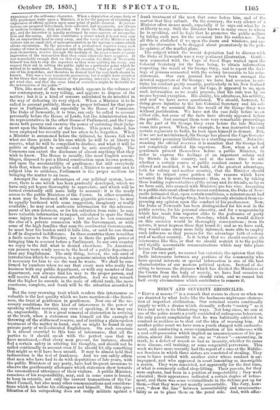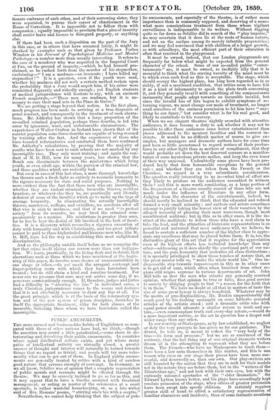MERCY AND SEVERITY RECONCILED.
" EiTun si muove !" is a remark that recurs to cheer us when we are daunted by what looks like the barbarous nightmare obstruc- tion of imperfect civilization. Our criminal courts continually supply us with a drama which dismally reflects " society " as it lives and acts in its blundering ways. Not long since, we saw at one of the police courts a youth convicted of outrageous behaviour, his only parent complaining that he was habitually addicted to conduct so reckless as to shut out the idea of rescuing him. At another police court we have seen a youth charged with embezzle- ment, and conducting a cross-examination of his witnesses with a cool self-possession which implied an unconsciousness of his po- sition, almost like insanity in one so " clever "—amounting, in truth, to a defect of reason as bad as insanity, whether its cause were disease, evil training, or some congenital perversion. This week we have more recently had the report of a case at the Middle- sex Sessions in which three sisters are convicted of stealing. They seem to have resided with another sister whose conduct is un- impugned, and who appeared in court lamenting so incorrigible a mania. They were convicted, not apparently for the first time, of what is commonly called shop-lifting. Their parents, for they were orphans, had been in a position of respectability ; they were educated ; their appearance indicated a certain degree of refine- ment, and there was some verisimilitude in the defence put up for them,—that they were not morally accountable. The Jury, how- ever, " drew the line " between accountability and unaccounta- bility so as to place them on the penal side. And, with affec- tionate embraces of each other, and of their sorrowing sister, they were separated, to pursue their career of chastisement in the House of Correction. It is impossible not to follow them with compassion ; equally impossible to proclaim that a plea of insanity shall confer leave and licence to disregard property, or anything else.
If there had been such a disposition on the part of the Jury in this case, or in others that have occurred lately, it might be checked by examples such as that given by Professor Forbes Winslow in his Journal of Psychological Medicine and Mental Pathology—a number more than usually interesting. It refers to the case of a murderer who was acquitted in the Imperial Court at Pau, on the ground of insanity,—which he had himself pro- claimed, as he rushed forth from the murder of his stepmother, exclaiming—" I am a madman—an insensate ; I have killed my stepmother l " It is a question, even if the youth were mad, whether his madness did not with a certain method reckon upon the probability that a Jury would acquit him, if his crime were committed flagrantly and nakedly enough ; yet English students of medical jurisprudence will hesitate to say, with an eminent French magistrate,—" These men are madmen, but it is ne- cessary to cure their mad acts in the Place de Greve."
We are getting a stage beyond that notion. In the first place, much progress has been made in arriving at a true diagnosis of penal conduct, and consequently in the treatment of such aberra- tions. Mr. Adderley has shown that a large proportion of the so-called criminal population, perhaps three-fourths, is led into error by ignorance, want, and unfavourable circumstance. The experiences of Walter Crofton in Ireland have shown that of the convict population some three-fourths are capable of being rescued by training after the fact. And the experiences of those who have founded reformatories and conducted them have confirmed Mr. Adderley's calculations, by proving that the majority of youths who have been sent to such schools are not marked by any incorrigible vice. They only want training ; and again the con- duct of 31. D. Hill, now for many years, has shown that the Bench can discriminate between the misfortunes which bring youth, or even adult age, within the purview of the criminal law, and those qualities which are radically bad. But even in cases of this last class, a more thorough knowledge has thrown such a fresh light as entirely to reconcile humanity to the rigours necessary for state and social purposes. Nothing is more evident than the fact that those men who are incorrigible, whether they are violent criminals, incurable thieves, reckless brawlers, or whatever else they be, are practically and literally deficient of some of the faculties which go to make up the type of average humanity. In eliminating the actually incorrigible thieves, murderers, ruffians, and swindlers, we ascertain after all that vice is akin to madness, and that if we need " to protect society" from its assaults, we may treat the criminal com- passionately as a maniac. His misfortune is greater than ours, for he has to bear the denial of life involved in the lack of facul- ties. It is a discovery which reconciles a rigorous execution of duty with humanity and with Christianity, and too great tribute cannot be paid to those highminded and humane men who, like M. D. Hill, have led the way in establishing this most enlightened discrimination.
And as the philosophy unfolds itself before us we recognize the fact that crime itself claims our sorrow more than our indigna- tion. We learn, practically, in the living flesh and in detail, that aberrations such as those which we have mentioned at the begin- ning of this paper, do involve some degree of unaccountability in one shape or other,—do not merit the arrogant contempt and finger-pointing scorn with which they have heretofore been treated ; but do still claim a kind and curative treatment. For never can we presume that cure may not arrive some day, if we persevere conscientiously enough. If, therefore, judges and juries find a difficulty in "drawing the line" in individual cases, a truly Christian jurisprudence comes to the rescue and declares that it is not absolutely necessary to draw any line at all. For the great principle which is at the basis of the reformatory sys- tem and of the new system of prison discipline, furnishes in itself the appropriate treatment, alike for both classes of the incurable, including those whom we have heretofore called the incorrigible.



























 Previous page
Previous page